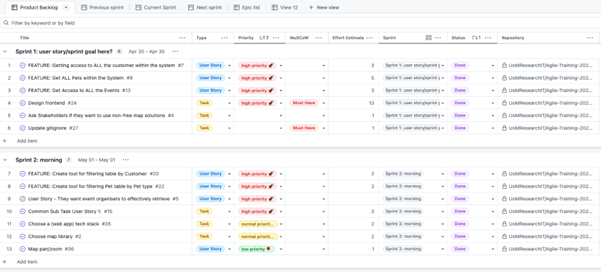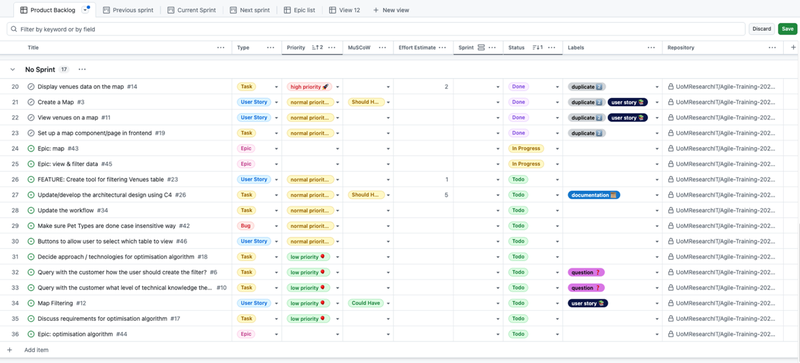Introduction
After the enthusiastic response to last year’s inaugural Agile Methods for RSEs training course, the RSE department returned in 2025 with a deeper, more refined experience. This year’s iteration was shaped by a full year of real-world application of our lightweight, tailored version of Scrum, purpose-built for the unique demands of research software development. With stronger learning support, expanded content, and continuous feedback loops, this year’s edition reflected not only growth in process but in community - as the training empowered RSEs in ways that enhanced collaboration and outcomes across the broader research ecosystem.
Background
The Agile training course began in 2024 as part of a broader departmental effort to improve project management and service delivery in ways that support both our team and our academic collaborators. Drawing on best practices from commercial software engineering, while staying grounded in the realities of research, we developed a lightweight, flexible interpretation of Scrum that has become our standard approach to delivery and oversight. The primary aim was to create a practical approach with appropriate tooling, introducing processes that add value without unnecessary overhead. Last year’s workshop launched the first iteration along with a handbook to help RSEs implement it. This year, we’ve refined our approach through real-world use and open feedback, while including several new features offered by the GitHub platform.
What’s New This Year
This year’s session wasn’t just a repeat of the last, it was shaped by what the team experienced, experimented with, and fed back over the past year. We strengthened our emphasis on guided learning by assigning a dedicated facilitator to each group, helping them work through a series of structured, lesson-based challenges. These challenges gave senior RSEs – acting as Scrum Masters – and developers the opportunity to practise key elements of our agile process using our chosen tooling, GitHub.

Through hands-on activities, participants tackled typical agile tasks in ways that mirrored real project scenarios. We also explored newly released GitHub features designed to make agile workflows more powerful and transparent in the research software context. All of this was captured in updated course materials and our departmental handbook, shaped by insights gathered throughout the year from real-world challenges encountered by our RSEs during the application of agile practices.

The workshop also offered a rare and valuable opportunity to bring almost the entire department together in one space. Over two days, colleagues reconnected across teams and roles, sharing ideas and enjoying meaningful face-to-face interaction.
Since last year’s course, we have welcomed new RSEs across all levels of seniority. The workshop served as both an onboarding experience and an introduction to a core aspect of the department service delivery process. For new starters, it was a crash course in how the department thinks and works. For those returning, it was a chance to refresh their knowledge, explore updated content, and deepen their understanding of agile practices. For everyone, it reinforced the value of shared ownership, transparency, and continual improvement.

What Our RSEs Think
I really enjoyed the Agile workshop. Before becoming an RSE, my Agile knowledge was mostly theoretical. Since starting Year In Industry, I’ve followed others’ approaches, picking things up as I go. Learning the ‘textbook’ version gave me a solid foundation, and I see real value in revisiting this training annually. After the workshop, even senior teammates refined the backlog and used task hierarchies, labels, and estimates more consistently. Task hierarchy was tricky at first, but once it clicked, breaking tasks down became easier. I also learned how to create a basic Blazor web app and connected with RSEs I don’t usually work with.
The Agile Training course provided a valuable opportunity to explore the Agile project management framework used within the RSE department. I enjoyed the friendly, hands-on, and collaborative nature of the sessions, which not only deepened my understanding of GitHub project tools but also fostered insightful discussions around the why behind Agile practices. Observing how others engaged with the process offered practical tips and perspectives. The course material was clear and immediately applicable, and they are already improving the organisation of my own projects—enhancing clarity and visibility for all stakeholders.
I took the course last year as a developer, so it was great to return this year and upskill in my role as Scrum Master. I picked up some useful new GitHub features and deepened my understanding of the process of breaking down and working through a problem in an agile way. About halfway through the course, I had a bit of a lightbulb moment: everyone else here is training too! As a Scrum Master, one of my key responsibilities is helping developers understand and follow the Scrum process. That shifted my focus from just learning for myself to actively supporting my team by sharing the knowledge I’d gained and putting it into practice.
The agile training provides a thoughtful and informative perspective on how we, as RSEs, use the Scrum framework. I’m currently using Scrum as an RSE with an external team, and while there are some differences in how it’s implemented, the core principles remain consistent. It’s been especially valuable to hear how other RSEs approach similar challenges, sparking some really engaging discussions. I also find the personalised RSE GitHub template to be a practical and lightweight alternative to tools like Jira.
After last year’s Agile training, I better understood how to apply Agile principles aligned with our department’s workflows. This year built on that by introducing GitHub workflows and changelog management, which I’ve successfully implemented to streamline releases. The session also clarified how to use issue types more effectively, improving project structure and team handovers. I appreciate how the training encourages consistency across teams, easing collaboration and transitions. However, I observed that participants tend to focus more on the technical tools than the Agile principles, I look forward to future sessions that offer a more balanced approach.
I enjoyed this second iteration of the Agile workshop, and it has helped re-enforce my day-to-day use of these processes. Short development cycles and regular updates for project partners help us respond quickly to changing requirements. We often focus solely on the product to be delivered, so holding these workshops creates space for us as a group to step back and reflect on the processes we follow. I highly recommend this workshop to anyone wanting to use Agile methods in their work.
Looking Ahead
We’re proud of how the course has grown, but we see it as just another iteration. Being comfortable with agile practices is a journey, and this event is another step along that road for our RSEs. We’ll continue to evolve the format, materials, and approach, always shaped by the people who take part in it.
If you would like to find out more about the course we have developed and would like us to run it for your research group, contact Adina Rahim.
If you have any questions or thoughts about recent developments in the RSE department then please contact Adrian Harwood, Head of Research Software Engineering directly – we are happy to listen.

